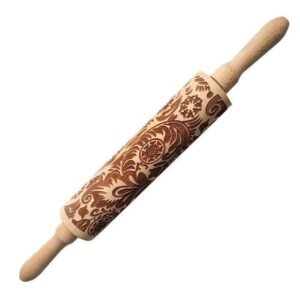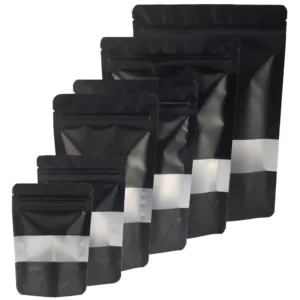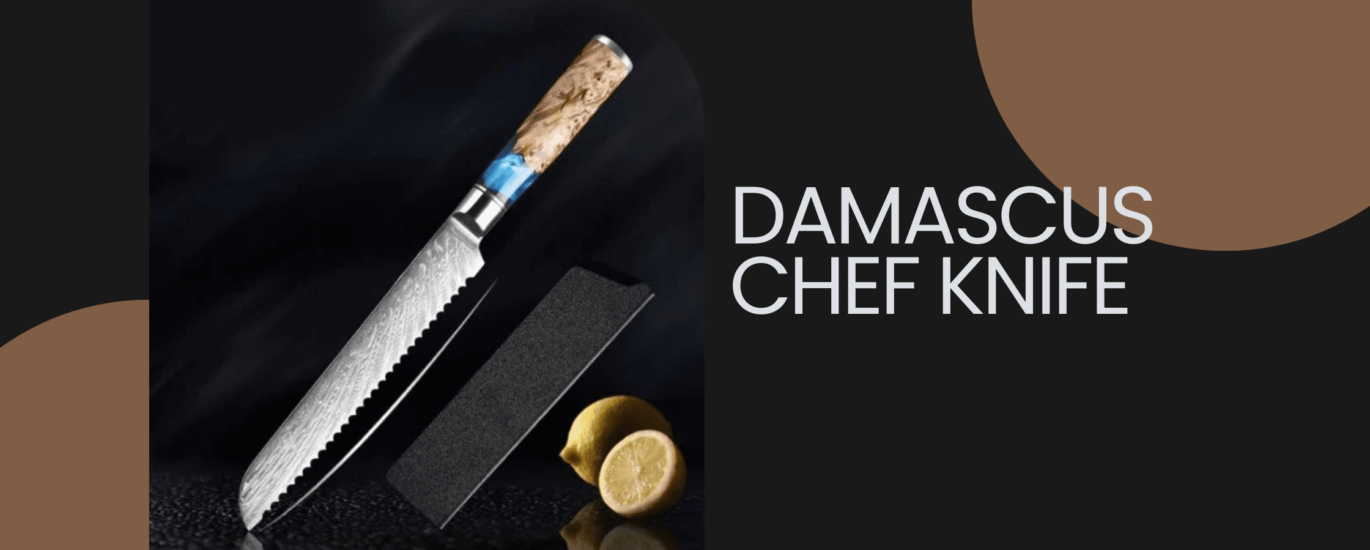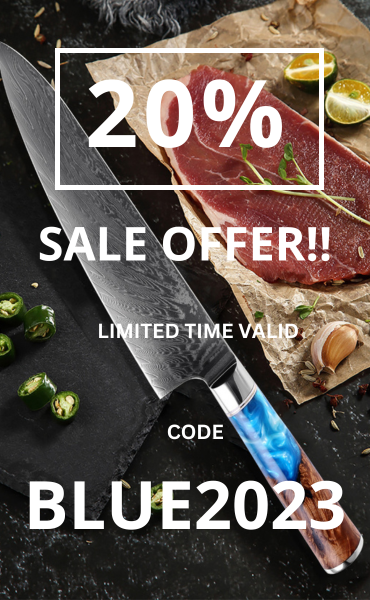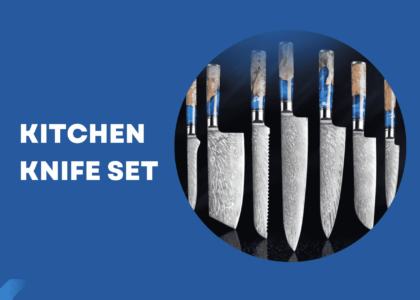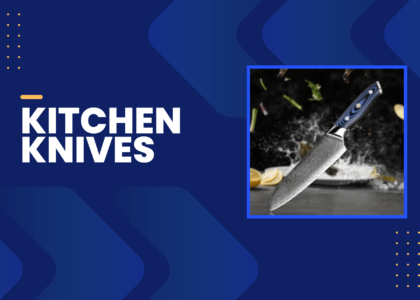Introduction
The Damascus chef knife is not merely a tool; it’s a piece of art in the culinary world. The intricate patterns and exceptional sharpness make it a sought-after piece among chefs and culinary enthusiasts alike. The aesthetic appeal is undeniably captivating, providing both visual and functional elegance in the kitchen.
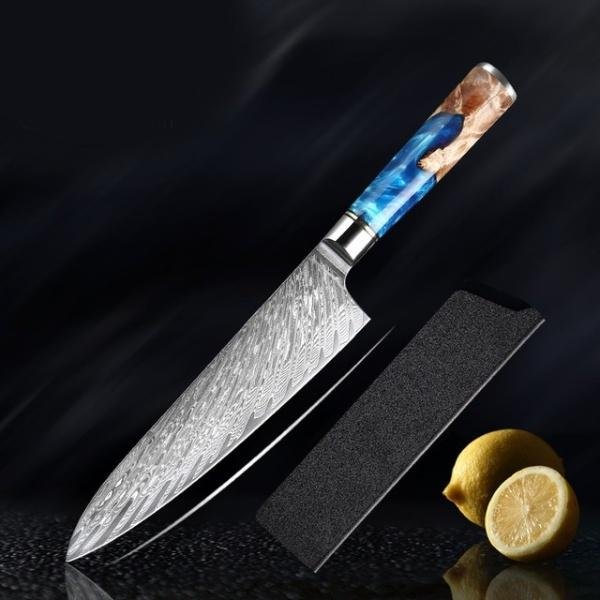
Unveiling the Aesthetic and Functional Allure
The Damascus chef knife is renowned for its distinctive patterns, often resembling flowing water or complex, interlocking designs. These patterns are not merely for show; they are a testament to the complex layering and folding of the steel during the forging process. The sharpness of these knives is unparalleled, offering chefs precision and consistency in every cut.
The Unique Patterns and Sharpness
The Damascus chef knife is renowned for its distinctive patterns, often resembling flowing water or complex, interlocking designs. These patterns are not merely for show; they are a testament to the complex layering and folding of the steel during the forging process. The sharpness of these knives is unparalleled, offering chefs precision and consistency in every cut.
The Craftsmanship Behind Damascus Chef Knives

Mysterious History of Damascus Knives
- Ancient Origins and Spread to the Middle East
The Damascus chef knife traces its roots back to ancient civilizations where the unique, wavy patterns of the steel were first developed. Originating in India and subsequently spreading to the Middle East, the steel became synonymous with quality and strength, being utilized in the creation of robust and sharp swords.
- Lost Methods of Original Production
The original methods of crafting Damascus steel were shrouded in mystery for centuries. The ancient techniques of forging, which resulted in the steel’s distinctive patterns and renowned sharpness, were lost to time. This loss transformed Damascus steel into a material of legend, known more for the myths surrounding it than its actual properties.
Modern-Day Damascus Knife Making
- Japanese Methods in Forging and Design
In the modern era, the art of crafting Damascus chef knives has been revived, particularly in Japan. Japanese blacksmiths, renowned for their skill in knife-making, adopted and adapted ancient techniques to create blades that are not only aesthetically pleasing with their distinctive patterns but also functionally superior. The Japanese methods emphasize precision, resulting in blades that are incredibly sharp and durable.
- The Process of Layering Steel and Creating Patterns
The creation of a Damascus chef knife involves a meticulous process of layering steel, forging it into a blade, and then manipulating the steel to create the characteristic patterns. This involves alternately layering hard and soft steel, which is then folded numerous times. The folding and layering process not only create the beautiful patterns but also contribute to the blade’s sharpness and durability.
| Step | Description |
|---|---|
| 1. Layering | Alternating layers of hard and soft steel are stacked and forged together. |
| 2. Folding | The layered steel is folded numerous times to create a multi-layered structure. |
| 3. Pattern Creation | Various techniques, such as acid etching, are used to reveal the layered patterns in the steel. |
Utilizing Damascus Chef Knives in Culinary Arts
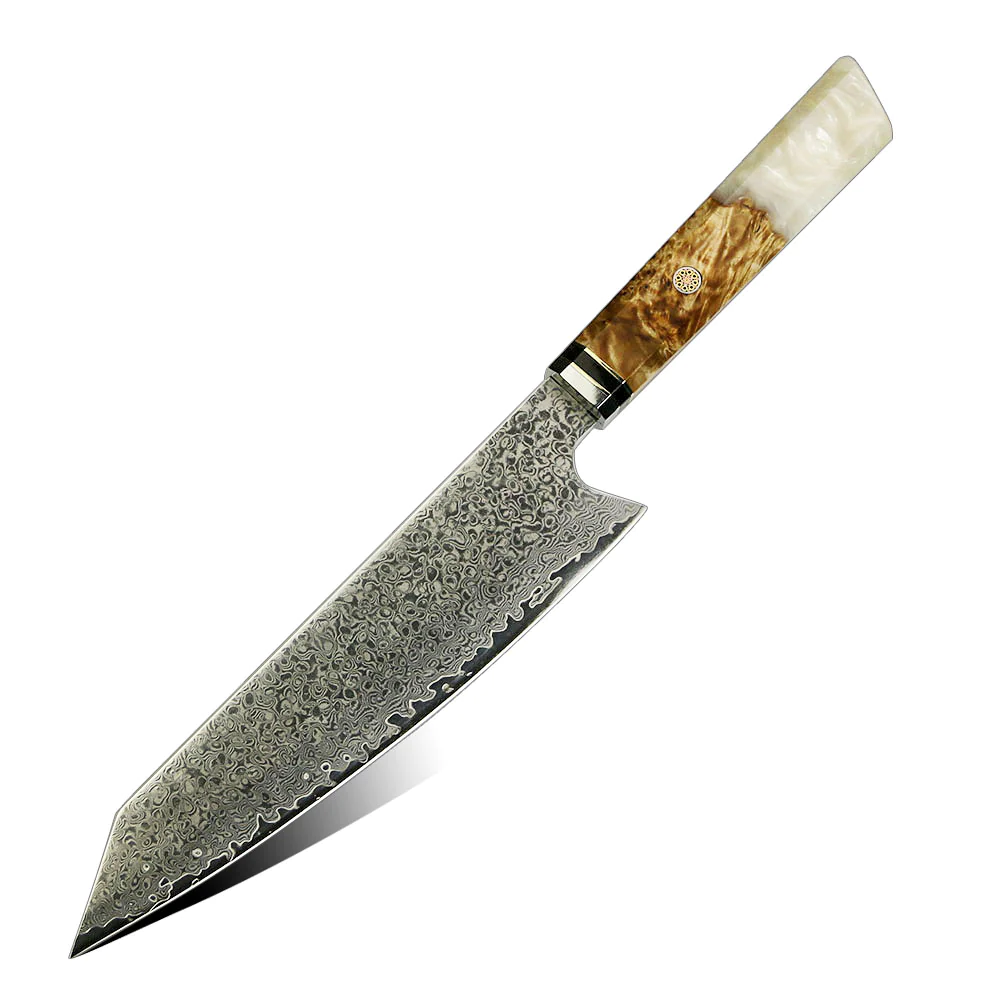
In the Professional Kitchen
- Preferred Choices of Chefs
In the realm of professional cooking, the Damascus chef knife stands out as a preferred choice among chefs. The unparalleled sharpness and durability of these knives ensure precise cuts and reliable performance, which are crucial in a professional setting. Chefs often seek knives that not only meet but exceed their performance needs, finding a reliable companion in Damascus steel.
- Impact on Food Preparation and Presentation
The impact of using a Damascus chef knife extends beyond its cutting capabilities. The precision and consistency it brings to food preparation also translate into a more refined presentation. The sharpness and balance of these knives allow chefs to execute delicate cuts and intricate carvings, enhancing the visual appeal of the dishes they create.
For Home Cooks
- Enhancing the Cooking Experience
For home cooks, a Damascus chef knife is more than a tool – it’s a ticket to an enhanced cooking experience. The sharpness and efficiency of these knives make food preparation not only easier but also more enjoyable. The aesthetic appeal of the knife, with its distinctive patterns, adds a touch of elegance to the home kitchen, making cooking a more delightful endeavor.
- Investment and Value
Investing in a Damascus chef knife is often seen as a valuable addition to a home kitchen. While the initial investment may be higher than other knives, the longevity and performance of Damascus steel provide excellent value over time. Home cooks find that the knife retains its sharpness and functionality through various culinary adventures, proving its worth as a valuable kitchen companion.
| Aspect | Professional Kitchen | Home Kitchen |
|---|---|---|
| Primary Use | Precision & Consistency | Ease & Enjoyment |
| Investment | High (due to demand) | High (for quality) |
| Key Benefit | Reliable Performance | Longevity |
Selecting a Damascus Chef Knife
In-depth Exploration of Damascus Chef Knives
The Damascus chef knife, renowned for its intricate blade patterns and exceptional sharpness, is a coveted item among culinary enthusiasts and professional chefs alike. Originating from a unique forging process known as “damascening,” these knives are not only a testament to superior craftsmanship but also a symbol of aesthetic elegance in the kitchen.
Versatility and Care
Damascus chef knives are celebrated for their versatility, capable of executing a myriad of culinary tasks from dicing to slicing with precision. However, their sharpness necessitates cautious handling and specific care routines. Ensuring they are always dry before storage, and maintaining their sharpness through regular honing, are pivotal to prolonging their lifespan and efficacy.
Investment Worthiness
While Damascus chef knives come with a higher price tag, their durability, performance, and aesthetic appeal justify the investment, especially for those serious about their culinary endeavors. The initial investment is offset by the longevity and reliable performance offered by these knives, ensuring they remain a staple in your kitchen for years to come.
Factors to Consider: Blade Type, Handle, and Pattern
Choosing the right Damascus chef knife involves considering several key factors to ensure it meets your culinary needs and preferences. The blade type, which can vary in length and shape, is crucial for specific cutting tasks. The handle, which should be comfortable and well-balanced, impacts the ease of use. Lastly, the pattern on the Damascus steel, while largely aesthetic, can also be a deciding factor for many enthusiasts and chefs.
Care and Maintenance Tips
Maintaining a Damascus chef knife involves regular sharpening to preserve its exceptional sharpness and ensuring it is stored correctly to prevent damage. Hand-washing and immediate drying are recommended to maintain the blade’s quality and prevent any potential for rust or deterioration. Regular oiling of the blade can also protect the steel and enhance its longevity, ensuring that the knife remains a staple in your culinary toolkit for years to come.
| Consideration | Description |
|---|---|
| Blade Type | Choose based on your cutting needs: length and shape are crucial. |
| Handle | Ensure it is comfortable and provides good balance for ease of use. |
| Pattern | Select a pattern that appeals to you aesthetically. |
| Care | Regular sharpening, hand-washing, and proper storage are vital. |
| Maintenance | Periodic oiling can protect and enhance the steel. |
In the journey of selecting and maintaining a Damascus chef knife, resources like various Damascus knife sets or high-end Damascus kitchen knives can provide valuable insights and options, assisting you in making an informed decision that will elevate your culinary adventures.
Conclusion and Final Thoughts
In the culinary world, the Damascus chef knife stands out as a symbol of exquisite craftsmanship and superior performance. From its ancient origins to its modern-day resurgence, this iconic knife has carved out a special place in the hearts of chefs and cooking enthusiasts alike. Whether you’re a professional chef seeking a reliable tool or a home cook looking to elevate your culinary experiences, the Damascus chef knife offers a blend of aesthetic appeal and functional excellence that is truly unparalleled.
FAQs
Is Damascus Chef Knife Good?
Yes, Damascus chef knives are renowned for their exceptional sharpness, durability, and unique patterns, making them a favored choice among professional chefs and culinary enthusiasts.
Is Damascus Steel Good for Cooking Knives?
Absolutely, Damascus steel is excellent for cooking knives due to its ability to maintain a sharp edge and its resistance to wear over time, providing reliable performance in the kitchen.
Are Damascus Knives Good Knives?
Indeed, Damascus knives are highly regarded for their quality, longevity, and aesthetic appeal, offering a blend of functionality and visual elegance in culinary settings.
Why is Damascus Knife So Expensive?
The Damascus knife carries a premium due to the complex manufacturing process, high-quality materials, and artisan craftsmanship involved in its creation, all contributing to its higher price point.
Frequently Linked Pages
1. Best Damascus Knives – Discovering the Best Damascus Knives: A 2023 Guide to Top-Quality Craftsmanship
2. Damascus Kitchen Knives – Crafting Excellence: Unveiling the World of Damascus Kitchen Knives
3. Damascus Kitchen Knife – Unlocking the Elegance of Culinary Art: An In-depth Exploration of Damascus Kitchen Knife
4. Damascus Knifes – Damascus Knifes: A Symphony of Craftsmanship and Functionality




